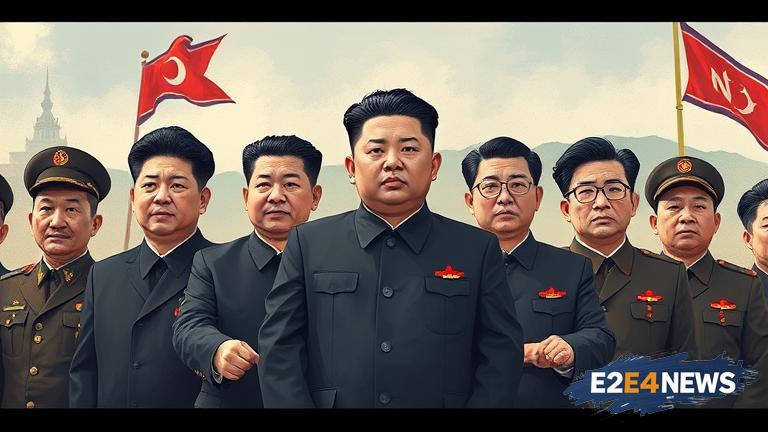North Korea, a country shrouded in mystery, has long been a subject of fascination and concern for the international community. At the heart of this enigmatic nation lies its leadership, a complex web of individuals who wield significant power and influence. The current leader, Kim Jong-un, has been at the helm since 2011, following the death of his father, Kim Jong-il. Kim Jong-un’s ascent to power marked a new era for North Korea, characterized by a mix of consolidation of power, economic development, and heightened tensions with the global community. One of the key figures in North Korea’s leadership is Choe Ryong-hae, a high-ranking official who has played a crucial role in the country’s political and economic affairs. Another important figure is Pak Pong-ju, who has been instrumental in shaping North Korea’s economic policies. The North Korean leadership is also comprised of various other individuals, including Kim Yong-nam, who has served as the President of the Presidium of the Supreme People’s Assembly, and Ri Yong-ho, who has been the country’s Foreign Minister. The leadership structure in North Korea is highly centralized, with decision-making power concentrated in the hands of a few individuals. This has led to a system where loyalty and obedience are paramount, and dissent is not tolerated. The country’s leadership has been known to take drastic measures to maintain control, including purges and executions of high-ranking officials. Despite these challenges, North Korea has made significant strides in recent years, including the development of its nuclear program and advancements in missile technology. The international community has been keenly watching these developments, with many countries expressing concern over the potential implications for regional and global security. The United States, in particular, has been vocal about its concerns, with President Donald Trump engaging in a war of words with Kim Jong-un in 2017. The situation has since eased, with both leaders meeting in Singapore in 2018 and agreeing to work towards denuclearization. However, progress has been slow, and the talks have been plagued by setbacks and disagreements. China, North Korea’s closest ally, has also been playing a crucial role in the negotiations, with President Xi Jinping meeting with Kim Jong-un on several occasions. The European Union has also been involved, with the bloc imposing sanctions on North Korea in response to its nuclear program. As the situation continues to evolve, it is clear that North Korea’s leadership will remain a critical factor in shaping the country’s future. The international community will be watching closely, as the actions of Kim Jong-un and his inner circle have significant implications for global politics and security. In recent years, North Korea has also been focusing on economic development, with a emphasis on self-sufficiency and domestic production. The country has also been investing heavily in its infrastructure, including the construction of new roads, bridges, and buildings. Despite these efforts, North Korea still faces significant challenges, including food shortages and a lack of access to basic services such as healthcare and education. The country’s human rights record is also a major concern, with reports of widespread abuses and mistreatment of citizens. As the international community continues to engage with North Korea, it is clear that a comprehensive approach will be needed to address the complex array of challenges facing the country. This will require a combination of diplomatic efforts, economic support, and humanitarian assistance. Only through a sustained and coordinated approach can the international community hope to make a meaningful impact and help North Korea transition towards a more stable and prosperous future. The role of the international community will be critical in this process, as North Korea’s leadership continues to navigate the complex web of global politics and diplomacy. As the situation continues to unfold, one thing is clear: the world will be watching North Korea’s leadership with great interest, as the actions of Kim Jong-un and his inner circle have the potential to shape the course of global events for years to come.
